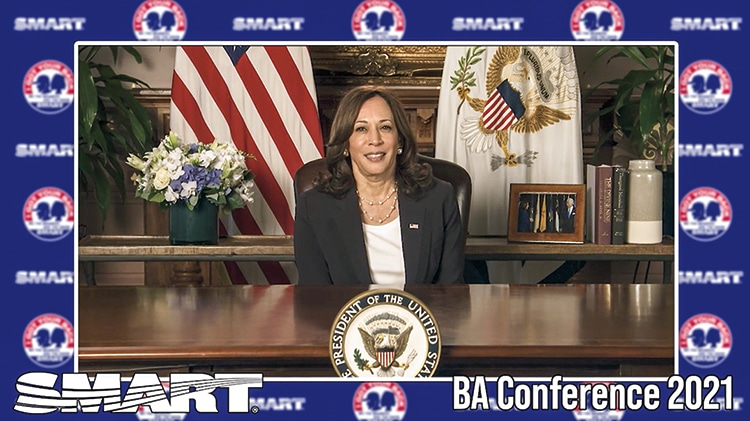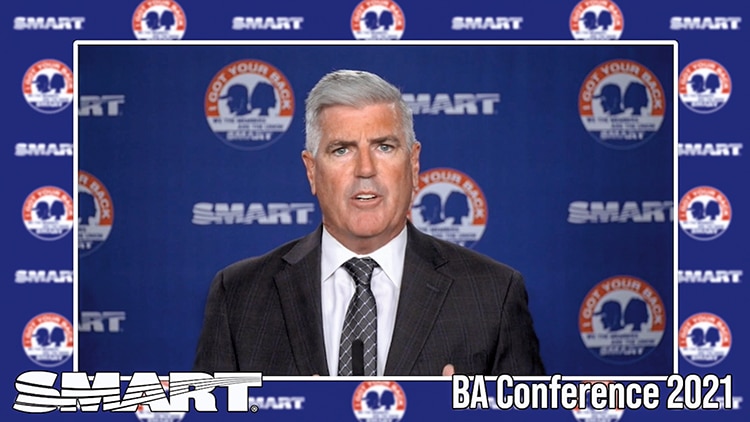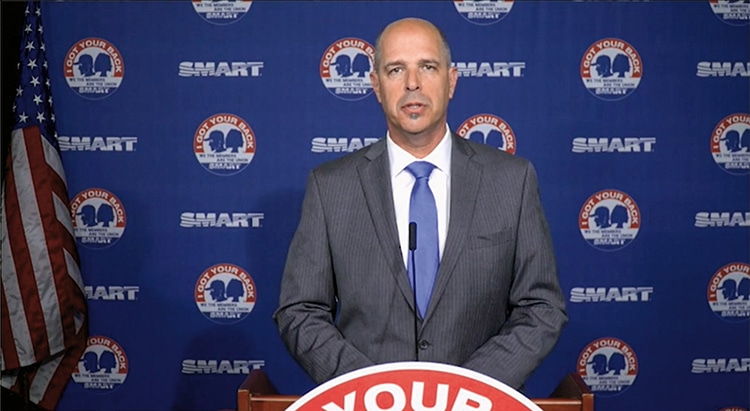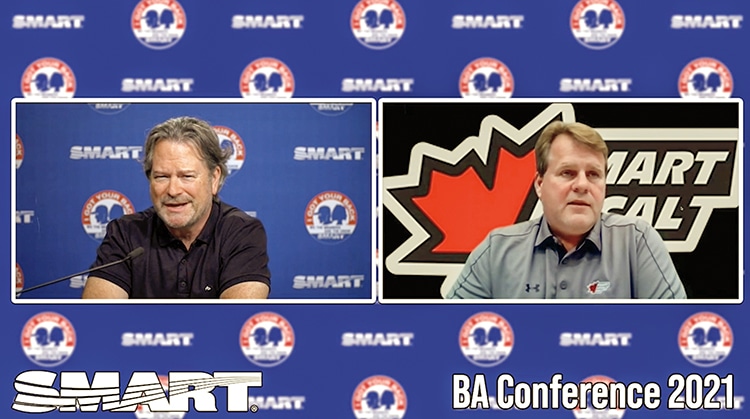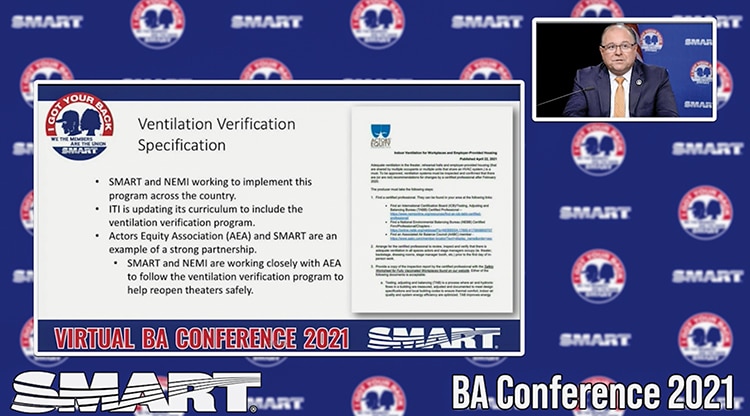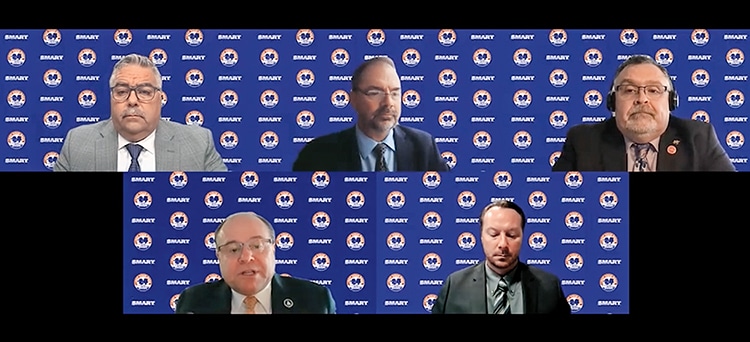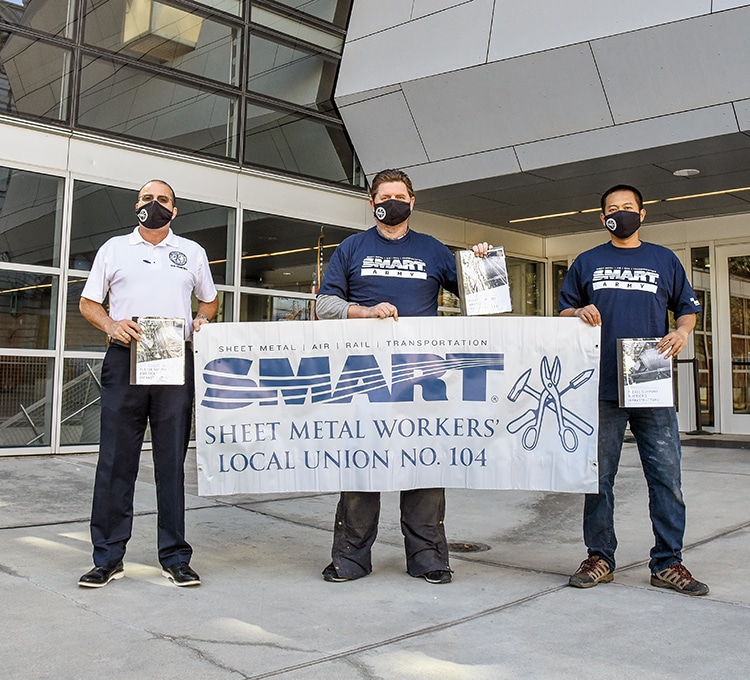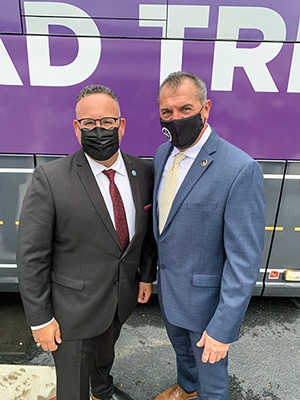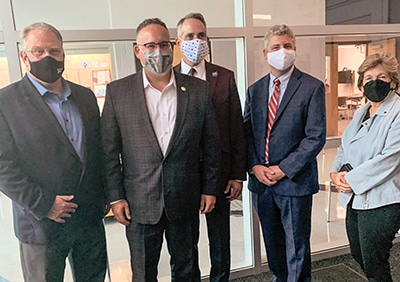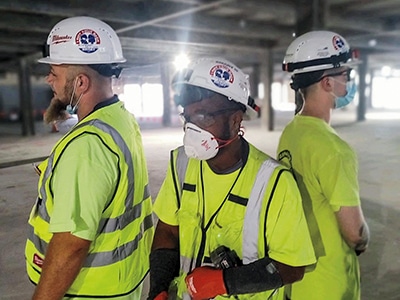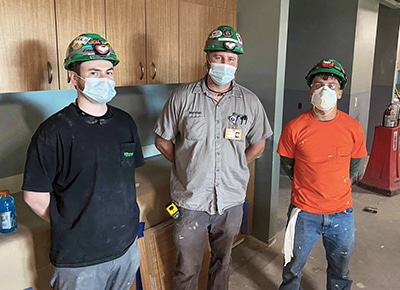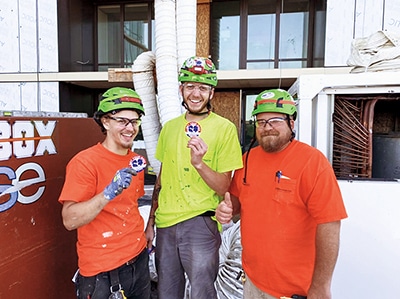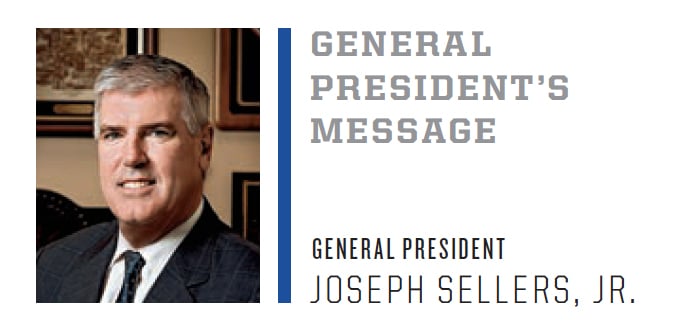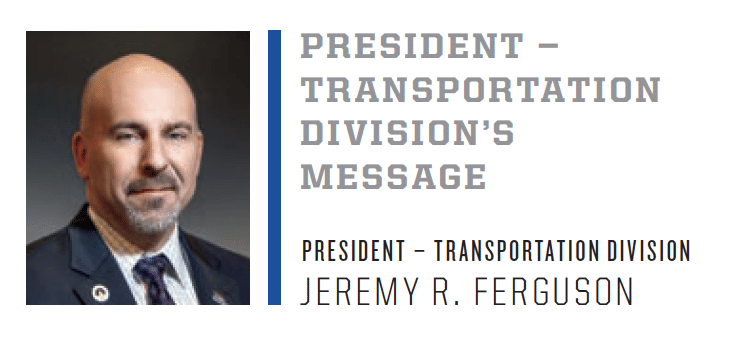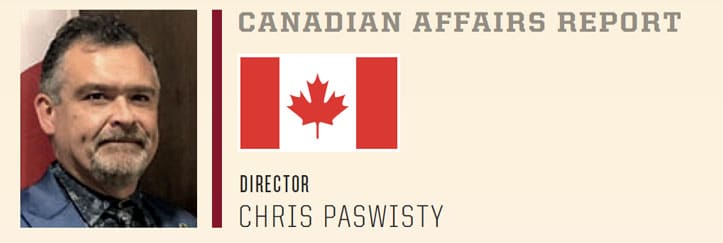Washington, DC—Last week, Congress unveiled a significantly scaled back version of the reconciliation bill. In response, SMART issued the following statement.
“This bill represents significant progress for working people and will create good union jobs. This legislation supports our members by applying labor standards to clean energy tax credits, supports workers’ right to organize, expands registered apprenticeship and pre-apprenticeship programs, invests in high-speed rail projects, and addresses indoor air quality in schools. Paired with the bipartisan infrastructure bill, these two pieces of legislation will help revitalize our economy and build back better. While this legislation is an important step forward, we still have work to do to fully rebuild our crumbling school infrastructure, strengthen rail and transit safety provisions and address other SMART priorities excluded from the package. We call on Congress to deliver on the entirety of President Biden’s agenda and pass both bills right away.”
Author: paul
Speakers and panels also focused on the importance of mentorship, moving a pro-labor agenda under the Biden administration, rail and transit safety, lessons learned from local SMART leaders and safe buildings post-COVID
SMART conducted a virtual business agents’ conference in July 2021. More than 300 local and national SMART leaders, as well as special guests that included Vice President Kamala Harris, participated in the one-day online gathering. An in-person conference had been scheduled to take place in New York City, but due to the unpredictability of the pandemic and rising COVID cases in the summer, it was changed to virtual.
The overall theme of the conference was “I Got Your Back,” with many plenary speeches and breakout sessions focused on the importance of union solidarity and working together to build a culture within SMART characterized by inclusion and mutual support.
“The past 16 months caused us to reflect on what is most important,” said SMART General President Joseph Sellers in his keynote speech to the conference. “We leaned on each other to get through this crisis, and union solidarity is our foundation. That is why this year’s theme is ‘I Got Your Back’.”
“The past 16 months caused us to reflect on what is most important. We leaned on each other to get through this crisis, and union solidarity is our foundation. That is why this year’s theme is ‘I Got Your Back’.”
– SMART General President Joseph Sellers
Sellers pointed out that, at the 2019 SMART General Convention, delegates took a hard look at how their sisters and brothers were treated at work and how this impacts SMART members and industries. Delegates unanimously adopted amendments and resolutions that aimed to make the union more inclusive and added language to the SMART Constitution that makes harassment, bullying and hazing chargeable offenses.
“Now, two years later, we need action,” said Sellers. “Words in our constitution are not enough. Goals and intentions are not enough. We are putting words to action… We are asking each member to stand up and look out for our fellow sisters and brothers.”
The week of the BA conference, SMART international mailed to every local an “I Got Your Back” campaign kit that included stickers, instructions and promotional materials.
“This campaign provides our membership with the opportunity to recognize those members who were there for them — who supported them — and to pay it forward to the next generation. When members see a fellow member wearing the ‘I Got Your Back’ sticker on the jobsite, they will know they have an ally to turn to. They will know that member has their back.”
SMART General Secretary- Treasurer Joe Powell, who taught hundreds of apprentices during his time as an apprenticeship instructor at Local 206 in San Diego, underscored the importance of mentorship for SMART members.
“We have all had mentors who had our backs during our careers,” said Powell. “And it is important for us to mentor and be an ally to those entering the industry behind us.”
SMACNA President Angie Simon echoed SMART’s commitment to diversity, inclusion and mutual support in her video presentation, noting that the signatory sheet metal sector “continues to shine,” but still has room for growth when it comes to recruitment and keeping up to date with technology.
“The future of our industry is not represented by one color, one race, or one gender,” said Simon, “but will depend upon the best and brightest being drawn to our industry by our training, our craftsmanship, the economic opportunity and unrestricted opportunity to succeed.”
Many speakers noted the unprecedented challenges and stresses faced by SMART members over the past year due to the pandemic and related economic turmoil and how members had risen to these challenges time and time again.
“You are the essential workers, representing our members throughout this pandemic,” said Sellers. “You have endured shutdowns, converted hospitals for COVID care, and manufactured the air handling equipment and goods that have kept our nations running and the air we breathe safe and clean.”

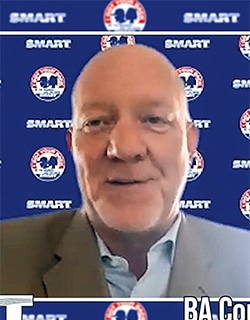
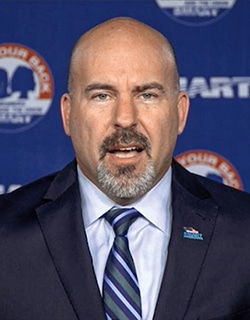
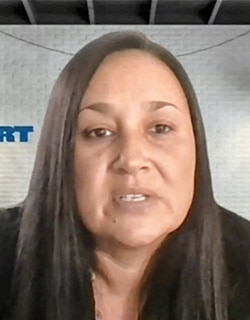
He emphasized the work SMART has been doing throughout the pandemic around rail safety, rail and transit funding and coordinating with the sheet metal division to work with the Biden Administration to advance initiatives important to SMART members. He added that most Amtrak members were recalled after passage of the American Rescue Plan, which SMART actively lobbied to support.
“We are continuing to battle to keep two people on every train, following the attacks on our crew consist agreements shortly after I took office,” added Ferguson. “Most importantly, we continue to fight for workplace safety, as our union has seen a startling number of fatalities and amputations in the last two years as a result of the previous U.S. president’s administration creating what I will call a ‘deplorable safety culture’ — one where profits and shareholders are valued more than our members lives or the federal safety regulations previously written to protect them.”
“We are continuing to battle to keep two people on every train, following the attacks on our crew consist agreements shortly after I took office.”
– SMART Transportation Division President Jeremy Ferguson
In a video address to the BA conference, Vice President Kamala Harris underscored the Biden administration’s commitment to standing with working families.
“President Joe Biden and I are determined to be the most pro-union administration in American history,” said Harris. She noted that the American Rescue Plan, signed into law by President Biden, allocated nearly $31 billion toward supporting transit systems and workers impacted by the pandemic, as well as strengthening pension plans for workers across industries.
“We could not have passed the American Rescue Plan without your support and leadership,” she added.
Vice President Harris also addressed bipartisan infrastructure legislation, noting that SMART members know, perhaps better than most, that America’s infrastructure is in desperate need of update. Proposed infrastructure legislation, she said, “will put Americans to work in good, union jobs, fixing our roads and our bridges and modernizing our transit system.”
Other guest speakers included American Federation of Teachers President Randi Weingarten and North America’s Building Trades (NABTU) President Sean McGarvey.
Local 265 Business Representative Louise Medina spoke to conference participants in her capacity as president of the newly formed SMART Recruitment and Retention Council. Quoting from the council’s mission statement, she said it will help guide efforts “to recruit, retain and promote diverse groups in our organization and to ensure workplace equality within our industry; and to promote respect, inclusion and safe, non-hostile work environments at all levels of SMART.”
Medina, who also serves on the SMART Women’s Committee, said the new council plans to hold meetings twice a year, hopefully in person, to discuss these issues and develop resources, trainings and other materials to support locals and regional councils in recruiting and retaining underrepresented workers. If you have questions or need information on how to affiliate with the council, email Louise Medina at louise@smart265.org.
After the main conference plenary, delegates could choose among the following breakout sessions:
Profiles in Leadership
This session addressed fundamentals of leadership and featured interviews with local leaders discussing strategic thinking, challenges they have faced and leadership lessons learned. SMART Director of Education Chris Carlough led discussions with Local 285 Business Manager Bob Gougeon, NW Regional Council President Tim Carter and Local 265 Business Manager John Daniel.
Beyond Bias
This session featured Dushaw Hockett of SPACES introducing the concept of “implicit bias” and breaking down examples of what it can look like. The session concluded with a live Q&A session with General President Sellers and General Secretary- Treasurer Powell.
Safe Buildings Post-COVID
This session featured a panel discussing what every SMART leader needs to know about indoor air quality and proper ventilation coming out of the pandemic. Panelists included NEMIC Northeast Regional Representative Jeremy Zeedyk, ITI Field Representative Darrell Garrison, SMART Director of Governmental Affairs Steve Dodd and SMART Director of Canadian Affairs Chris Paswisty.
At the same time, SMART is working on making sure Congress gets this package right. That’s why it is essential that Congress passes the bipartisan infrastructure deal and reconciliation package together and that both contain strong labor and worker protections.
If and when it is passed, it will represent the largest infrastructure investment in almost a century, with the potential to create a generation of good-paying union jobs.
This means any project receiving federal support complies with a base of labor standards that include prevailing wage, registered apprentices, the elimination of misclassification and wage theft, and neutrality agreements so that workers are given a fair choice to form or join a union.
The package includes local hire provisions, so wages stay local, and robust funding for school construction, so schools can improve and update indoor air quality and put thousands of SMART members to work.
President Biden proposed $100 billion for school construction and, as of now, that number is fluctuating during negotiations.
Additionally, the House reconciliation package includes rail and transit safety provisions that will keep Amtrak and transit operations fully funded while providing a jumping-off point to enhance safety for America’s railroaders.
See Below For Highlights of Currently Proposed Legislation That Will Have A Direct Impact On SMART Members
HIGHLIGHTS OF CURRENT STATE OF BUDGET RECONCILIATION:
(as of Oct. 25, 2021)
- Over $180 billion in clean energy tax credits, with a bonus tax credit for paying prevailing wages & using registered apprentices.
- New $4,500 tax credit for union-made electric vehicles built in the United States.
- New $500 tax credit for batteries manufactured in the United States.
- Some of the most significant labor reforms since the New Deal have the potential for being passed in this bill. This includes new civil monetary penalties for existing unfair labor practices committed by employers during union organizing campaigns. The penalties are a dramatic step up from current sanctions and reach $50,000-$100,000 per violation.
- New civil monetary penalties for new unfair labor practices, which include the holding of captive audience meetings, striker replacements, mis classification, lockouts and compulsory arbitration with fines of $50,000-$100,000 per violation.
- For the first time, sanctions can be made against individual corporate officers, so directors and company CEOs can be personally liable. For example, if a director knew about an unfair labor practice and didn’t do anything about it, he or she could be held personally liable with significant penalties.
- In 2017, the Trump administration removed the tax deduction for union dues. In this bill, that deduction is restored with a $250 cap.
- Currently, $82 billion for school construction and modernization is included in this bill.
- An additional $74 billion is included for job training that includes the expansion of registered apprenticeships and funds new workforce training programs to fight climate change.
- For the first time ever, Universal Paid Leave is included, with up to 12 weeks, along with a $3,000 per child tax credit extended to 2025. This is in addition to universal pre-K for 3- and 4-year-olds, as well as two years of free community college.
- Over $15 billion is included in this bill to build childcare centers, which includes work for energy retrofits and HVAC systems that will put union sheet metal workers to work.
- There is a $50 billion increase in affordable housing, which includes building energy retrofits & HVAC systems to put members to work.
HIGHLIGHTS OF CURRENT BIPARTISAN INFRASTRUCTURE LEGISLATION FOR SMART:
(as of Oct. 25, 2021)
- $550 billion over current spending on basic infrastructure, which is mainly focused on building roads, bridges, airports, electric vehicle charging stations, drinking water, transit, rail/Amtrak and power grid modernization.
- The bipartisan infrastructure bill includes $250 million to be used for an energy efficiency revolving loan fund, which can be spent on indoor air quality.
- $50 million for an energy efficiency pilot program for nonprofit buildings to conduct energy efficiency upgrades, including HVAC systems.
- $500 million for school energy efficiency that can be used to upgrade ventilation.
- $6 billion for Northeast Corridor grants, along with an additional $16 billion for the national rail network.
- $36 billion for the Federal-State Partnership for Intercity Passenger Rail, with $24 billion set aside for the Northeast Corridor.
- $5 billion for the Consolidated Rail Infrastructure and Safety Improvement (CRISI) grant program.
- $3 billion for the Railroad Crossing Elimination Program.
- $50 million for restoration and enhancement of the current rail system.
- New stipulation that prohibits contracting out work if current employees who can perform that work are currently furloughed, as well as new requirement that requires Amtrak to staff station agent positions at stations that receive certain levels of traffic.
- New rules requiring that Amtrak and commuter rail employees who are victims of assault must now be covered by critical incident stress plans and the benefits and protections provided by such plans.
- To avoid reduction in operating service, a new rule is included that increases the difficulty for Congress to eliminate a long distance route.
- An additional $74 billion is included for job training that includes the expansion of registered apprenticeships and funds new workforce training programs to fight climate change.
- For the first time ever, Universal Paid Leave is included, with up to 12 weeks, along with a $3,000 per child tax credit extended to 2025. This is in addition to universal pre-K for 3- and 4-year-olds, as well as two years of free community college.
- Over $15 billion is included in this bill to build childcare centers, which includes work for energy retrofits and HVAC systems that will put union sheet metal workers to work.
- The bill requires a National Academies study on the safety of trains longer than 7,500 feet, as well as the requirement that FRA incident reports include information on train length, the number of cars and the size of the crew on board. The DOT must also create a process to better involve stakeholders, including rail labor representatives, in its investigations.
- Finally, a new rule requires a quarterly report on failures and functions of Positive Train Control technology.
SMART members lead in push for infrastructure
The I Got Your Back Campaign took off this August with stickers distributed to locals across North America for members to share with their mentors. Below are a few of the submissions the Journal has received. Contact your Business Manager or a local officer for a sticker to share with your fellow members and post your photos and stories online with the hashtag #SMARTIGOTYOURBACK
You can also email your stories and photos to mentors@smart-union.org

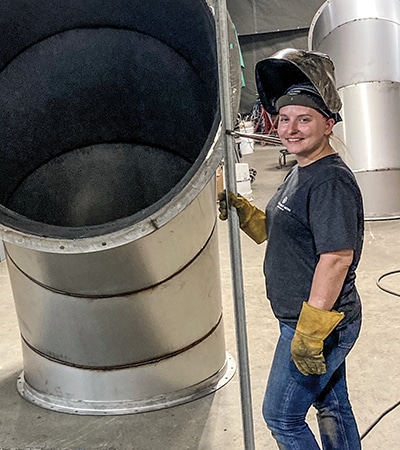
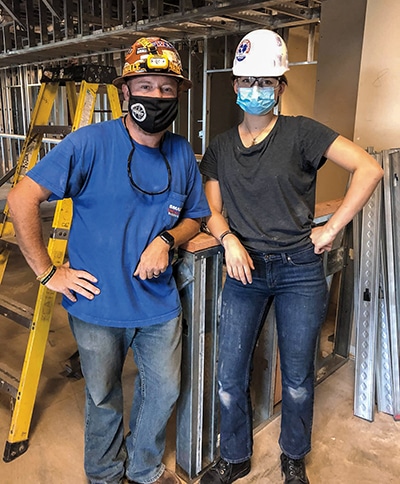
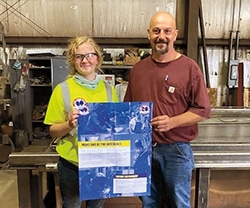
SMART Local 18 sheet metal workers at JM Brennan on the St. Camillus new retirement housing high rise have each others’ backs:
September was Suicide Prevention Month. The October 2021 episode of Talking SMART focused on suicide prevention, substance abuse disorder, addiction and all the resources and support available to our members through the SMART Member Assistance Program, or SMART MAP.

Our featured guest, SMART Director of Education Chris Carlough, is a man who wears many hats in our union. In addition to preparing new generations of union leaders for the tasks they have ahead of them when they start their careers, he also runs SMART MAP.
“When I hear that we have people that need help,” said Carlough, “I think back to when I needed help and the call was received. And I got the help that I needed. And I believe it’s my duty to go and do the same thing for our members and the families that are out there struggling.”
At the end of this episode, listen for the open mic segment with SMART General President Joseph Sellers. He responds to a question about the suicide prevention trainings that SMART is hosting, and how they can help connect SMART members in crisis with member assistance programs.
Return to Talking SMART index page.
Talking SMART is a member of the Labor Radio Podcast Network — working people’s voices, broadcasting worldwide 24 hours a day.
SMART has long been committed to creating an environment of welcoming, belonging, and excellence for all of our members. However, SMART recognizes that not all individuals and groups are situated the same, with the same access to resources and opportunities.
Therefore, the BE 4 All effort is a targeted approach to ensure that all members, particularly those from historically marginalized groups, experience these universal goals.
We need a culture that enables our union to attract and retain the best, most skilled workers. And in doing so, affirms the dignity and worth of every human being who walks through our doors. We need to reinforce union solidarity so that each and every one of us has the other’s back. We need an industry that embodies professionalism – not only in our technical skills, but in the work environment we create, free from harassment, discrimination, bullying, and hazing. We need an industry where our members and contractors can do the best possible work efficiently and effectively. These are all critical ingredients to creating a thriving culture and industry. And SMART believes BE 4 ALL is the vehicle for how we make this happen.
SMACNA’s leadership shares our vision for transforming the industry. Over the last year we have engaged in numerous discussions with SMACNA’s leadership, as well as International Training Institute (ITI) representatives, to build alignment and a shared sense of purpose. To be clear, this effort is not about blaming or shaming individuals or granting special treatment to one segment of the membership over another. It is about increasing awareness about how we can create an environment for welcoming, belonging, and excellence – one that attracts and retains anyone who has the skills and desire to meet our culture of excellence. It is about union solidarity.
To that end, we are seeking volunteers to join SMART’s Belonging and Excellence for All Committee. The Committee is a collective of 10 to 12 representatives who will help shape and guide this work over the next year. The Committee will work on SMART’s diversity, equity, and inclusion issues, as well as work collectively with SMACNA’s Committee and ITI representatives to ensure a broad and effective process.
Seven Other Things You Should Know About the Be 4 All Process:
- Committee members will help guide the overall direction of the diversity, equity, and inclusion work and make recommendations to leadership. The goal is a passionate and committed group with representation across regions, roles, and identities.
- SMART has appointed Donna Silverman, Assistant to the General President and Special Counsel, to staff the SMART Committee. From SMACNA, Joye Blanscett, Dir. Of Labor Services, will help staff the SMACNA Committee. Dushaw Hockett, our outside belonging and excellence expert, will provide facilitation and technical support. Donna, Joye, and Dushaw will coordinate our combined efforts.
- On the question of time commitment, it’s envisioned that Committee members will meet at least twice per month through October 2022. Total time commitment (including meetings, emails, document review, etc.) is expected to be a minimum of 6 hours per month. Most meetings will be conducted virtually, with the exception of a few in-person meetings if they can be held safely.
- To apply, please visit this link and provide a short (one paragraph) statement of interest. Also share your answers (encouraged but not required) to the 8 identity/demographic questions that follow, as we are seeking to build a team that reflects diversity in all areas.
- Staff and leadership will select Committee members based on the content of their statements of interest, and with an eye toward representation from across the organization.
- Because the goal is to embody diversity, equity, and inclusion in every aspect of our work, including this process, if there is overwhelming interest in serving on the Committee, we may propose a modified structure.
- Applications are due by Friday, October 15, 2021.
